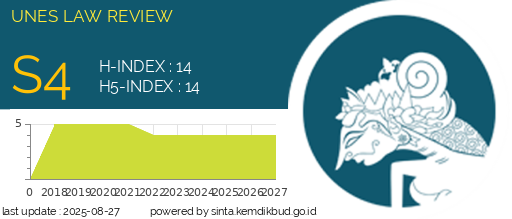Pertimbangan Hakim dalam Memutuskan Perkara Kasus Pindana Korupsi di Kota Blitar
DOI:
https://doi.org/10.31933/unesrev.v7i1.2331Keywords:
Corruption, Bank Teller, and FinancialAbstract
Corruption is a serious crime that harms the nation both financially and morally. This study attempts to highlight a case of corruption committed by a bank teller in Blitar City, involving numerous government officials. In the context of the case faced, one of the defendants, Evi Sulistia Watiningsih, acted as a teller at PD. BPR Artha Praja, Blitar City. This research uses a normative legal analysis method with a case study approach. The result of this study is that the defendant, Evi Sulistia Ningsih, was found guilty of committing corruption in collaboration with others, and was sentenced by the judge to four (4) years in prison and fined 100,000,000 rupiahs with an additional punishment if the fine is not paid. The punishment given by the judge is in accordance with Law No. 20 of 2001 concerning corruption (tipikor), and it is hoped that it will serve as a lesson for the defendant not to commit the same act in the future, which would harm the nation's finances
Downloads
References
Einstein, T., & Ramzy, A. (2020). Eksistensi Komisi Pemberantasan Korupsi Berdasarkan Undang-Undang Nomor 19 Tahun 2019 Tentang Perubahan Kedua Atas Undang-Undang Nomor 30 Tahun 2002 tentang Komisi Pemberantasan Tindak Pidana Korupsi. National Journal of Law, 3(2).
Jain, A. K. (2011). Corruption: Theory, evidence and policy. CESifo DICE Report, 9(2), 3–9.
Kenneth, N. (2024). Maraknya Kasus Korupsi di Indonesia Tahun ke Tahun. JLEB: Journal of Law, Education and Business, 2(1), 335–340.
Manan, B. (2003). Teori dan politik konstitusi.
Nasrullah. (2019). Teori dan Asas Pidana Korupsi. Bandar Publihsing.
Putra, N. R., & Linda, R. (2022). Impact of social change on society from the crime of corruption. Integritas: Jurnal Antikorupsi, 8(1), 13–24.
Setiawan, I., IP, S., & Si, M. (2016). Mengikis Perilaku Korupsi Pada Birokrasi Pemerintahan. Jurnal Ilmu Pemerintahan Widya Praja, 42(1).
Setiawan, I., & Jesaja, C. P. (2022). Analisis Perilaku Korupsi Aparatur Pemerintah Di Indonesia (Studi pada Pengelolaan Bantuan Sosial Di Era Pandemi Covid-19). Jurnal Media Birokrasi, 33–50.
Siregar, M. (2023). ANTIKORUPSI. UWKS Press.
Downloads
Published
How to Cite
Issue
Section
License
Hak cipta :
Penulis yang mempublikasikan manuskripnya di jurnal ini menyetujui ketentuan berikut:
- Hak cipta pada setiap artikel adalah milik penulis.
- Penulis mengakui bahwa UNES Law Review berhak menjadi yang pertama menerbitkan dengan lisensi Creative Commons Attribution 4.0 International (Attribution 4.0 International CC BY 4.0) .
- Penulis dapat mengirimkan artikel secara terpisah, mengatur distribusi non-eksklusif manuskrip yang telah diterbitkan dalam jurnal ini ke versi lain (misalnya, dikirim ke repositori institusi penulis, publikasi ke dalam buku, dll.), dengan mengakui bahwa manuskrip telah diterbitkan pertama kali di Jurnal UNES Law Review.



















